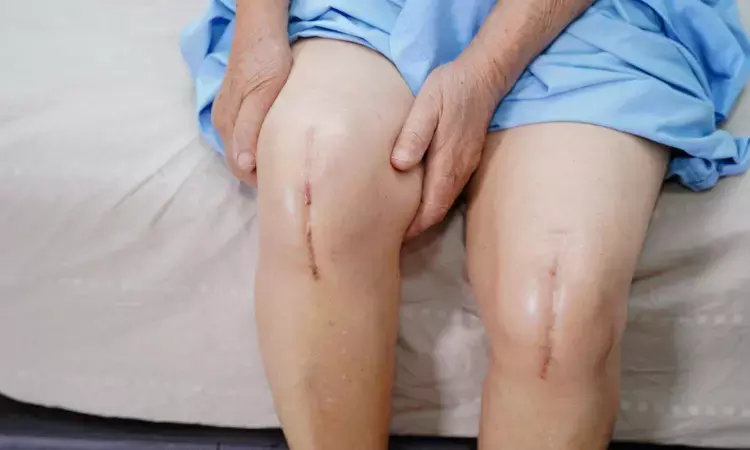- Home
- Medical news & Guidelines
- Anesthesiology
- Cardiology and CTVS
- Critical Care
- Dentistry
- Dermatology
- Diabetes and Endocrinology
- ENT
- Gastroenterology
- Medicine
- Nephrology
- Neurology
- Obstretics-Gynaecology
- Oncology
- Ophthalmology
- Orthopaedics
- Pediatrics-Neonatology
- Psychiatry
- Pulmonology
- Radiology
- Surgery
- Urology
- Laboratory Medicine
- Diet
- Nursing
- Paramedical
- Physiotherapy
- Health news
- Fact Check
- Bone Health Fact Check
- Brain Health Fact Check
- Cancer Related Fact Check
- Child Care Fact Check
- Dental and oral health fact check
- Diabetes and metabolic health fact check
- Diet and Nutrition Fact Check
- Eye and ENT Care Fact Check
- Fitness fact check
- Gut health fact check
- Heart health fact check
- Kidney health fact check
- Medical education fact check
- Men's health fact check
- Respiratory fact check
- Skin and hair care fact check
- Vaccine and Immunization fact check
- Women's health fact check
- AYUSH
- State News
- Andaman and Nicobar Islands
- Andhra Pradesh
- Arunachal Pradesh
- Assam
- Bihar
- Chandigarh
- Chattisgarh
- Dadra and Nagar Haveli
- Daman and Diu
- Delhi
- Goa
- Gujarat
- Haryana
- Himachal Pradesh
- Jammu & Kashmir
- Jharkhand
- Karnataka
- Kerala
- Ladakh
- Lakshadweep
- Madhya Pradesh
- Maharashtra
- Manipur
- Meghalaya
- Mizoram
- Nagaland
- Odisha
- Puducherry
- Punjab
- Rajasthan
- Sikkim
- Tamil Nadu
- Telangana
- Tripura
- Uttar Pradesh
- Uttrakhand
- West Bengal
- Medical Education
- Industry
Periarticular Glucocorticoid Injection Comparable to Intravenous for Pain Relief After Knee Surgery, finds study

China: A recent prospective, randomized, and controlled study has provided new insights into the effectiveness of intraoperative glucocorticoid administration methods in improving clinical outcomes after total knee arthroplasty (TKA). The research, published in the Journal of Orthopaedic Surgery, focused on evaluating whether the route of glucocorticoid administration—either intraoperative intravenous or periarticular injection—affects pain management and recovery after surgery.
The study found that intraoperative periarticular glucocorticoid injections provide comparable pain relief to IV injections during the postoperative period following TKA and may offer enhanced effectiveness by the second postoperative day. Additionally, periarticular injections do not present any increased risk or complications for patients.
Total knee arthroplasty is a common surgical procedure aimed at relieving pain and restoring function in patients with severe knee arthritis. The use of glucocorticoids, known for their anti-inflammatory properties, is a well-established practice to enhance postoperative outcomes. However, the best protocols for administering glucocorticoids are still debated. Considering this, Qingtian Li, Southern Medical University, Guangzhou, China, and colleagues aimed to compare the efficacy of glucocorticoids between intravenous and periarticular injection on clinical outcomes.
A total of 114 patients were randomly divided into two groups: the intravenous (IV) group (n = 57) and the periarticular injection (PI) group (n = 57). The IV group received 10 mg of dexamethasone intravenously, while the PI group received a 10 mg periarticular injection of dexamethasone during the procedure. Clinical outcomes were evaluated using the visual analogue scale (VAS), knee society score (KSS), range of motion (ROM), knee swelling, inflammation markers, and post-TKA complications.
The following were the key findings of the study:
- The VAS score during walking on 2nd day postoperatively was lower in the PI group compared with the IV group (2.08 ± 1.45 versus 2.73 ± 1.69), and there was no significant difference at the other time points of VAS score in the two groups.
- The inflammation markers, knee swelling, knee ROM, and KSS score were not statistically different.
- The occurrence of vomiting and other complications was not significantly different between the two groups.
The study had limitations, including its single-center design, short duration, and lack of a placebo group. Additionally, the adductor nerve block used for pain management may have masked early postoperative pain. However, the researchers noted that this block was necessary to reduce pain and nausea after TKA for ethical reasons.
"The study demonstrates that intraoperative periarticular glucocorticoid injections offer comparable pain relief to IV injections following TKA, with potential added effectiveness on the second postoperative day. Additionally, periarticular glucocorticoid injections do not introduce extra risks or complications for patients," the researchers concluded.
Reference:
Li, Q., Fang, G., Liao, W., Chen, B., Yang, Y., Liao, J., Fu, G., Ma, Y., & Zheng, Q. (2024). Intraoperative intravenous versus periarticular injection of glucocorticoids in improving clinical outcomes after total knee arthroplasty: A prospective, randomized and controlled study. Journal of Orthopaedic Surgery. https://doi.org/10.1177_10225536241256554
Dr Kamal Kant Kohli-MBBS, DTCD- a chest specialist with more than 30 years of practice and a flair for writing clinical articles, Dr Kamal Kant Kohli joined Medical Dialogues as a Chief Editor of Medical News. Besides writing articles, as an editor, he proofreads and verifies all the medical content published on Medical Dialogues including those coming from journals, studies,medical conferences,guidelines etc. Email: drkohli@medicaldialogues.in. Contact no. 011-43720751


